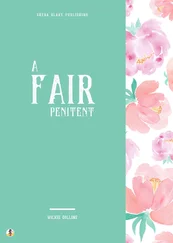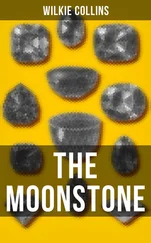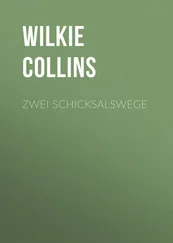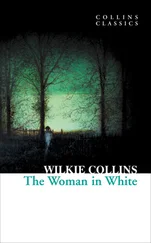A new strain of music, loud and jubilant, rose from the hidden shrine. The crowd around me shuddered, and pressed together.
The curtain between the trees was drawn aside, and the shrine was disclosed to view.
There, raised high on a throne—seated on his typical antelope, with his four arms stretching towards the four corners of the earth—there, soared above us, dark and awful in the mystic light of heaven, the god of the Moon. And there, in the forehead of the deity, gleamed the yellow Diamond, whose splendour had last shone on me in England, from the bosom of a woman’s dress!
Yes! after the lapse of eight centuries, the Moonstone looks forth once more, over the walls of the sacred city in which its story first began. How it has found its way back to its wild native land—by what accident, or by what crime, the Indians regained possession of their sacred gem, may be in your knowledge, but is not in mine. You have lost sight of it in England, and (if I know anything of this people) you have lost sight of it for ever.
So the years pass, and repeat each other; so the same events revolve in the cycles of time. What will be the next adventures of the Moonstone? Who can tell?
ADDED BY FRANKLIN BLAKE.—Miss Clack may make her mind quite easy on this point. Nothing will be added, altered or removed, in her manuscript, or in any of the other manuscripts which pass through my hands. Whatever opinions any of the writers may express, whatever peculiarities of treatment may mark, and perhaps in a literary sense, disfigure the narratives which I am now collecting, not a line will be tampered with anywhere, from first to last. As genuine documents they are sent to me—and as genuine documents I shall preserve them, endorsed by the attestations of witnesses who can speak to the facts. It only remains to be added that “the person chiefly concerned” in Miss Clack’s narrative, is happy enough at the present moment, not only to brave the smartest exercise of Miss Clack’s pen, but even to recognise its unquestionable value as an instrument for the exhibition of Miss Clack’s character.
See Betteredge’s Narrative, chapter viii.
by Franklin Blake.—The writer is entirely mistaken, poor creature. I never noticed her. My intention was certainly to have taken a turn in the shrubbery. But, remembering at the same moment that my aunt might wish to see me, after my return from the railway, I altered my mind, and went into the house.
Wherever the Report touches on the events of the birthday, or of the three days that followed it, compare with Betteredge’s Narrative, chapters viii. to xiii.
Конец ознакомительного отрывка
Купить книгу










